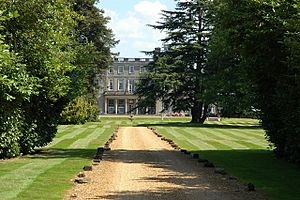Andrew Archer (1659–1741) facts for kids
Andrew Archer (born August 2, 1659 – died December 31, 1741) was an important landowner and politician from Umberslade Hall in Tanworth in Arden, Warwickshire, England. He was a member of the Tory Party and served in the House of Commons (which is like a main part of the British Parliament) at different times between 1690 and 1722.
Andrew Archer's Early Life
Andrew Archer was born on August 2, 1659. He was the oldest son of Thomas Archer, who also lived at Umberslade, and his mother Anne Leigh. His father had been a military leader during the English Civil War.
Andrew went to Trinity College, Oxford when he was 18 years old. Later, in 1680, he joined the Inner Temple, which was a place where people studied to become lawyers. When his father passed away in 1685, Andrew inherited Umberslade Hall.
In 1693, Andrew married Elizabeth Dashwood. Her family had connections to important people, including a leading Tory politician in Warwickshire. This marriage helped Andrew connect with powerful people in the world of finance and politics.
His Political Journey
Andrew Archer first became a Member of Parliament (MP) for Warwickshire in 1690. An MP is someone elected to represent their area in the House of Commons, where laws are made. He won his first election against other candidates.
In 1695, he became a Commissioner, helping to rebuild the town of Warwick. He was elected as an MP again that same year. Andrew often voted with the Tory party. For example, in 1696, he voted against a special punishment called an "attainder" for a person named Sir John Fenwick.
In 1697, Andrew helped create a new law. This law made it possible for local officials to order that roads be made wider. He did not run for election in 1698. Instead, he spent the next few years rebuilding his family home, Umberslade. By 1700, he became a deputy lieutenant, which was a local official role.
Andrew stayed interested in politics. In 1705, he was asked to become an MP again for Warwickshire in a special election. He won without anyone running against him. He was very active in Parliament during this time. In 1708, he was re-elected as an MP for Warwickshire without opposition. He often spoke up for the Tories and helped pass a law to build a new church in Birmingham.
He was involved in the case of Dr. Sacheverell, a famous preacher. Andrew voted against trying to remove Dr. Sacheverell from his position in 1710. He chose not to run for election that year.
In 1711, Andrew was given an important job. He became a Commissioner to investigate military spending in Spain, Portugal, and Italy. He traveled for two years and found many cases of dishonest practices. However, he felt his hard work was not fully recognized.
In 1713, the local leaders in Warwickshire asked him to run for MP again. He was elected without anyone running against him. He continued to vote with the Tories but sometimes voted with the Whigs (the opposing party).
Andrew Archer was elected one more time in 1715. He supported the opposition party until he decided not to run for election in 1722.
Later Years and Family
In his later years, Andrew Archer spent a lot of time building a large library at Umberslade Hall. He passed away on December 31, 1741, at his home.
He had several children:
- Diana Archer, who married Thomas Chaplin
- Thomas Archer, 1st Baron Archer (1695–1768)
- Henry Archer (1700–1768), who married Elizabeth Montagu
- Anne Archer
- Elizabeth Archer
- Sarah Archer
Both of Andrew's sons, Thomas and Henry, also became Members of Parliament in 1735, following in their father's footsteps.
 | James Van Der Zee |
 | Alma Thomas |
 | Ellis Wilson |
 | Margaret Taylor-Burroughs |


